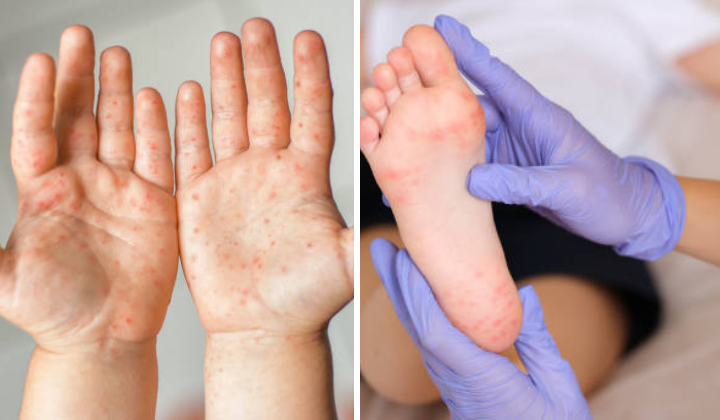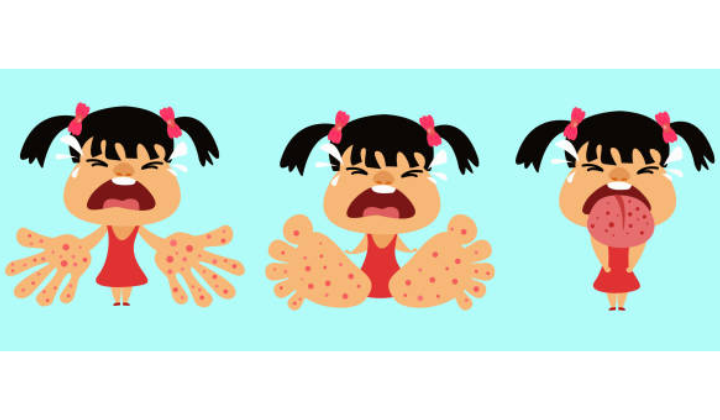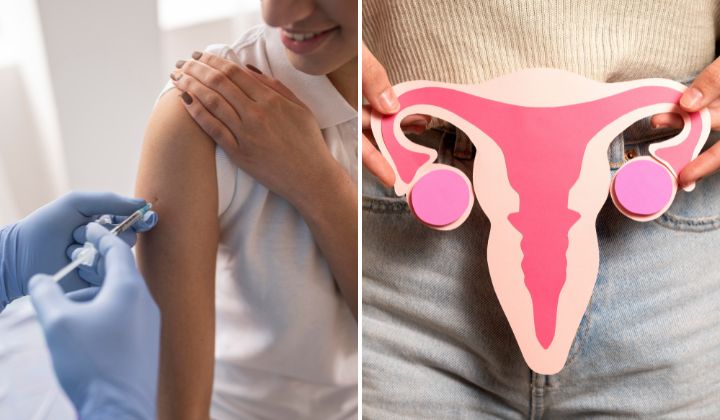HFMD Cases On The Rise, Doctor Shares Tips And Debunks Myths
The number of hand, foot and mouth disease (HFMD) cases in the country exceeded the national alert level of 1,150 cases per week during Epidemiological Week (EW) 19.

Subscribe to our Telegram channel or follow us on the Lumi News app for the latest stories and updates.
Since May of last year, several states have recorded an increase in Hand, Foot, and Mouth Disease (HFMD) cases, including Selangor, Sabah, and Johor.
On May 20, Malay Mail reported Director-General of Health, Datuk Dr. Muhammad Radzi Abu Hassan noted that the number of cases nationwide had exceeded the national warning level of 1,150 cases per week in Epidemiological Week (EW) 19.
It is also understood that there are currently 170 clusters that have caused many children to fall ill, resulting in parents struggling to care for their HFMD-infected children.
Despite the alarming numbers and the prevalence of this disease, many parents are unfortunately ill informed about it and do not know what to do when faced with this viral infection.
In a statement, the Head of the Department of Pediatrics at the International Medical University (IMU), Dr Erwin Khoo, shared three important facts about HFMD together with useful tips for parents.
HFMD Is Highly Contagious, Virus Can Remain Dormant For 2 Weeks
According to Khoo, the common symptoms include fever, mouth sores, and rashes.
HFMD and chickenpox are examples of viral exanthems (rashes or skin inflammation caused by viral infections).
Unlike chickenpox, the rash usually does not appear on the body but rather on the hands and feet, and sometimes on the knees, elbows, and buttocks.
The cause of HFMD is the virus, usually Coxsackie A16 and Enterovirus 71. These viruses can be found in the respiratory tract and feces, as well as in the fluid-filled blisters that form on the hands and feet. The viruses can easily survive on hard surfaces for several days. The incubation period is usually between 3 to 7 days and can last up to two weeks. This makes HFMD highly contagious among close contacts and in situations where toys and utensils are shared, or when hand hygiene is not practiced properly, especially after changing soiled diapers.
Dr Erwin Khoo
Did You Know..Adults Can Also Contract HDMF?
While many see HFMD as a disease that only affects children (as most cases involve children under the age of 6), adults can also contract it just like any child out there.
Additionally, while the common belief is that adults will experience severe symptoms, studies have found that adults typically only have milder symptoms.
And, infected adults, like children, can transmit the virus to others.
An example, according to Khoo, would be those working in childcare centers with HFMD cases that can bring the virus home, eventually infecting their partners, children, and elderly.
He also noted that it is not impossible to contract HFMD more than once due to different strains, and immunity to enteroviruses is temporary.

Unfortunately There Is No Specific Cure Or Treatment For HFMD.
It is also important to note that there is no way to prevent HFMD.
Although different viruses can cause HFMD, there is no specific treatment or medication to reduce the symptoms and the available methods only aim to alleviate the symptoms.
Khoo also warned against some commonly shared remedies, such as bathing with coarse salt or soaking in enzyme-based water, as they can irritate the skin.
He also noted that there is no evidence to suggest that these methods speed up the usual healing process, which typically takes between 7 to 10 days.
So, What Can Parents Do?
Having a child with HFMD at home immediately suggests that the parents need to be more cautious and vigilant about limiting contact with the infected individual and practicing good hand hygiene.
Similar to the preventive measures taken during a pandemic, parents and caregivers should wash their hands or use hand sanitizers frequently, especially after caring for an HFMD-infected child.
Common areas in the house should also be regularly disinfected, and sharing food and utensils should be avoided.
Khoo also noted that touching one’s eyes or nose should also be avoided.
These measures should be continued for up to 10 days.
Additionally, he advised that confirmed HFMD cases in children should stay at home to prevent the spread of the infection to others.
However, he stressed that extreme measures such as isolating the child in a separate room are excessive and not necessary because the HFMD-causing virus does not spread through the air like other respiratory infections.
Extra Steps That Parents Can Follow.
- Treat fever by giving paracetamol or non-steroidal anti-inflammatory drugs (NSAIDs), which can also help reduce pain and inflammation from mouth ulcers. However, parents should seek advice from a pediatric specialist before giving NSAIDs to their children.
- Provide the child with easily swallowed foods such as soups and rice porridge as alternatives to solid foods that require chewing.
- Prevent dehydration by giving the child their favorite beverages or juices.
- Soothe mouth ulcers with cool snacks such as ice cream, yogurt, and jelly. Mouth rinses without alcohol and mouth gels can also help.
- Bathe frequently to relieve itching and gently dry with a towel to prevent the blisters from bursting (if present). Avoid harsh soaps and rough scrubs that can further irritate the skin.
- Avoid using air conditioning at night (if possible). Mouth ulcers can become more painful due to reduced saliva production in drier environments. If the weather is hot, it is more helpful to use a humidifier or place a bowl of water to ensure a moist environment. If the pain prevents the patient from resting, seek advice from a pediatric specialist regarding the use of pain relievers even without a fever.
Serious Complications Caused By HFMD.
In most cases, home recovery with over-the-counter treatments is sufficient to relieve symptoms such as fever, rashes or red spots on the hands or feet, and mouth ulcers.
Although the spots are not itchy, the ulcers in the mouth can be painful and prevent children from drinking, eating, and swallowing normally. This can lead to dehydration and, in serious cases, require medical treatment.
Dr Erwin Khoo
If this occurs, parents can take the following steps:
- If the child is urinating less, has a dry mouth, and lacks tears when crying, these are signs of severe dehydration and require immediate medical treatment.
- Seek immediate medical treatment if symptoms such as rapid breathing, confusion, drowsiness, dizziness, stiff neck, seizures, fever lasting more than three (3) days, and refusal to eat or drink occur.
- Although not common, HFMD can cause viral meningitis. It is best to consult a doctor to prevent this complication.
In conclusion, although this situation is understandably distressing, Khoo suggests that it can be helpful to view it from a different perspective.
If you can arrange to take leave with a doctor’s referral to your employer, stay at home and spend time with your child. There are times when we don’t realize how quickly our children grow up.
Dr Erwin Khoo
Share your thoughts with us via TRP’s Facebook, Twitter, and Instagram.





